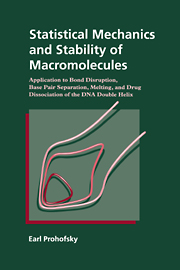 Statistical Mechanics and Stability of Macromolecules
Statistical Mechanics and Stability of Macromolecules Book contents
- Frontmatter
- Contents
- Preface
- 1 Introduction
- 2 Macromolecular stability
- 3 Lattice dynamics
- 4 Effective phonon theory
- 5 Premelting disrupted chemical bonds
- 6 Cooperative melting
- 7 Strained chemical bonds: salt and pressure effects
- 8 Bond disruption and conformation change: B to Z conformation change in DNA
- 9 Hydration effects: structural water
- 10 Helix with daunomycin intercalated: increased helix stability and daunomycin-DNA binding constant
- 11 Nonrepeating DNA
- 12 Cutting and splicing: junctions, inserts, and the replicating fork
- 13 Interaction between a helix and a single attached molecule
- 14 Energy considerations in bond opening
- Appendix 1 Helical lattice dynamics
- Appendix 2 Density matrix and effective phonon theory
- Appendix 3 Green functions
- References
- Index
2 - Macromolecular stability
Published online by Cambridge University Press: 16 September 2009
- Frontmatter
- Contents
- Preface
- 1 Introduction
- 2 Macromolecular stability
- 3 Lattice dynamics
- 4 Effective phonon theory
- 5 Premelting disrupted chemical bonds
- 6 Cooperative melting
- 7 Strained chemical bonds: salt and pressure effects
- 8 Bond disruption and conformation change: B to Z conformation change in DNA
- 9 Hydration effects: structural water
- 10 Helix with daunomycin intercalated: increased helix stability and daunomycin-DNA binding constant
- 11 Nonrepeating DNA
- 12 Cutting and splicing: junctions, inserts, and the replicating fork
- 13 Interaction between a helix and a single attached molecule
- 14 Energy considerations in bond opening
- Appendix 1 Helical lattice dynamics
- Appendix 2 Density matrix and effective phonon theory
- Appendix 3 Green functions
- References
- Index
Summary
Bounded and unbounded potentials
A molecular system is one in which the atoms are bound together by chemical bonds between specific pairs of atoms. To study the stability of molecular systems we have to study the stability of these individual chemical bonds. Often the bonds are not represented as a complex of electron orbitals but, rather, represented as attractive potentials between pairs of atoms that are functions only of interatom distance. All realistic models of these potentials are bounded. That is, if the two atoms involved are separated to large enough distances the interaction energy goes to zero, or depending on where one puts the origin in potential, to some finite value. Atoms are assumed to become independent of one another when separated by a large enough distance. In particular a bounded interaction potential does not go to infinity as the separation increases; if that happened atoms would be bound together the way quarks are and could never be found separated.
If one applies standard statistical mechanics to a molecule bound by such bounded potentials one always gets the result that the equilibrium state of the system is the dissociated state. In other words, the molecule is always melted. This is true at all temperatures, even infinitesimal temperatures, and is true for both classical and quantum analysis. In studying melting by statistical mechanics of systems with realistic potentials one is dealing with the contradictory situation of trying to study the melting of a molecule that is already melted.
- Type
- Chapter
- Information
- Statistical Mechanics and Stability of MacromoleculesApplication to Bond Disruption, Base Pair Separation, Melting, and Drug Dissociation of the DNA Double Helix, pp. 17 - 46Publisher: Cambridge University PressPrint publication year: 1995
